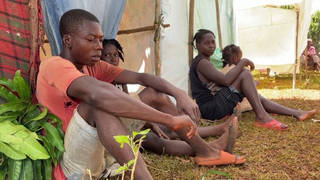
Guests
- Sharif Abdel KouddousDemocracy Now! producer speaking from Haiti. He is posting regular reports from Haiti on his Twitter page
Sharif reports Haitians are growing increasingly frustrated by how the United Nations is working with survivors of the earthquake. “They’re not interacting with people in the community,” he said. “They’re not interacting with people who can distribute aid effectively in the neighborhoods around Port-au-Prince.” [includes rush transcript]
Transcript
JUAN GONZALEZ: We’re still on the line with Amy Goodman and with Sharif Abdel Kouddous, who are in Port-au-Prince.
Amy, I’m wondering if Sharif can tell us about some of what he has seen and what he’s been reporting while he’s been there.
SHARIF ABDEL KOUDDOUS: Hi, Juan. Thank you for bringing me on.
You know, it’s hard to describe, really, the extent of the destruction here in Haiti, here in Port-au-Prince, where we’re speaking to you from. You drive and drive along the roads, and buildings are pancaked on top of each other, just completely destroyed. And even those ones that are still standing have huge cracks in them. They’re not structurally sound. We don’t know how Haiti will be rebuilt.
You know, with us in our group is the longtime journalist Kim Ives, and he said Haiti is like Gaza. And he couldn’t be more true. There’s tent cities everywhere. There’s refugees of the earthquake everywhere in Haiti, in Port-au-Prince. And there’s a real problem with the aid distribution here.
You know, we spoke with an aid worker here at the Matthew 25 House, and she described to us how there’s these red zones where the UN and larger aid agencies are not allowed to go. They need security clearance. They need an armed escort. And when the UN does come through, it really looks like an occupying force. These are soldiers. They’re heavily armed. They have helmets. They rush by, their sirens on. They quickly distribute aid and then leave. And it’s not seen — they’re not interacting with people of the community. They’re not interacting with people who can distribute aid effectively in neighborhoods around Port-au-Prince.
And I just want to describe a story that I think is extremely illustrative of the problem. Yesterday, when we were in Léogâne, we were — we came to an area where a helicopter from a Mormon charity had landed. It was on the ground, and there was Haitians all around, young and old, waiting for food to be handed out. This helicopter took off, off the ground, and began throwing the food down at the Haitians. It did not distribute it when it was on the ground. They threw the food from the air. These were packets of bread that they were throwing. It ignited just fury and indignation on the ground by the people there. They began screaming. One man started crying. He said, “We are a proud people. We are not dogs for you to throw bones at.” It was a scene that I will never forget. And it really illustrates the problem with aid distribution here and the relief efforts here, that they are — they are not seen as people. As Haitians keep saying, they say, “This can happen to anybody. How would you like to be treated in this way?”
And right here at the Matthew 25 House last night, there was a group of doctors from Denver who came here, who organized themselves. They came. They’re on the ground, in the streets. This is what’s needed. There’s plenty of doctors at the airport and plenty of aid pallets there, but they’re not where it’s needed. And these folks came here. They performed an amputation right in front of us for a young Haitian man in his twenties. They amputated the lower part of his left leg. And they’re taking care of hundreds of people in a soccer field out back from where we’re speaking to you right now. It’s also serving as a shelter for people who have lost their homes, which is a vast majority people living in Port-au-Prince.













Media Options